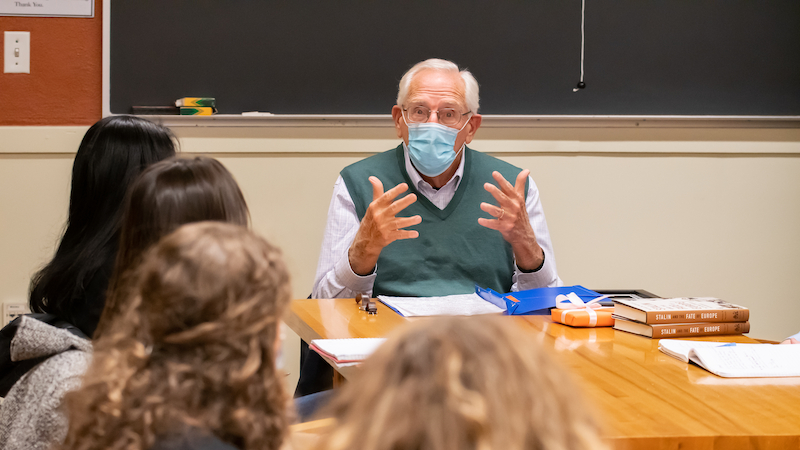
U.S.-Russia Relations Book Prize Recipient, Norman Naimark, Visits The Fletcher School for Book Talks
By Alex Avaneszadeh, MALD 2023 Candidate, The Fletcher School
On November 4, 2021, Norman Naimark visited The Fletcher School to speak at two events on his most recent books: Genocide: A World History (2016), and Stalin and the Fate of Europe: The Postwar Struggle for Sovereignty (2019), which won the 2020 U.S.-Russia Relations Book Prize. The events were co-organized by the Russia and Eurasia Program and the Fletcher Initiative on Religion, Law, and Diplomacy.
Naimark is a professor at Stanford University’s Department of History, and has been studying genocide since the 1990s. His academic path was heavily influenced by the Bosnian genocide in the Balkans. In his book, “Genocide: A World History,” Naimark describes the concept and historical occurrence of genocide, analyzing instances which took place long before the term was coined by Raphael Lemkin.
“Genocide has occurred since human history,” Naimark explained, spanning from the medieval crusades, American settler colonialism, the Armenian Genocide, and the Jewish Holocaust to the current persecution of the Uighurs in China.
He highlighted the causes of various genocides, stressing that “genocide is a product of modernity as well.” The establishment of new economic and/or social values, in addition to state- and nation-building processes, may lead to the exclusion and physical elimination of a group that serves as an obstacle to another group’s perceived progress. As such, Naimark articulated the five themes that lead to genocide: war, mass murder, dehumanization, economic motivations, and cumulative radicalization. The factors are not mutually exclusive, as they all interact to create the conditions for genocide to occur.
His second book, “Stalin and the Fate of Europe: The Postwar Struggle for Sovereignty” (2019), provides a unique perspective on the Cold War, depicting Europeans as “agents of their own future” rather than an entity that fell subject to U.S.-Soviet interactions.
Naimark stressed that post-World War II Europe was about economic and social re-building, or “emerging from the ruins to develop political movements for the achievement of sovereignty.” Such sovereignty corresponded to Europeans’ pursuit of their own destinies in liberal ways.
“Soviet, Russian, and American historiography are obsessed with the Cold War, but the Cold War was not the only thing,” he said. with the post-war period open to different evolutions than people would suggest.
In seven case studies of Bornholm Island, Albania, Finland, Italy, the Berlin blockade, Poland, and Austria, Naimark explored the strong liberal reactions to Soviet influence in order to maintain agency and sovereignty. His book’s main argument was that the Soviets and Stalin were ready to compromise in certain situations, as these countries’ sovereignty showed resistance to Moscow despite the outside perception of a “Soviet takeover.”
Building on the idea that “ideology takes over when diplomacy is abandoned,” Naimark posited that diplomacy played an important role in taming Moscow’s expansionist aspirations.

